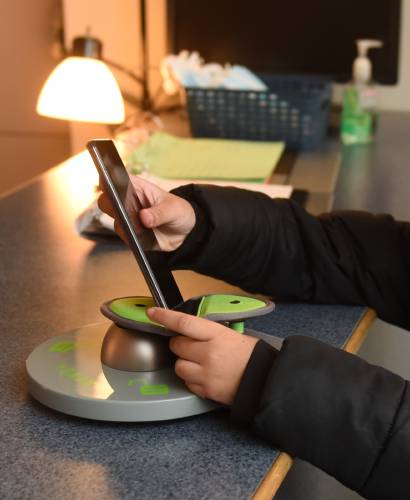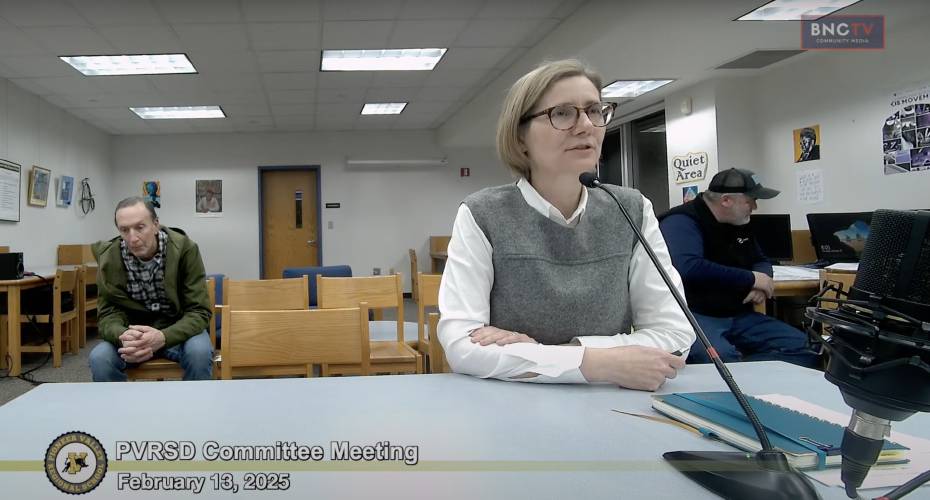Pioneer cellphone ban sees positive results
| Published: 02-19-2025 9:08 AM |
NORTHFIELD — Just five and a half months after implementing a cellphone ban for students, the effects are clear to Pioneer Valley Regional School District administrators: students are paying more attention in class and socializing among themselves instead of through a screen.
In summer 2024, the Pioneer School Committee unanimously adopted a policy restricting cellphone use in school. Much like Greenfield’s public schools, Pioneer adopted the use of magnetic Yondr pouches. Each student places their turned-off device into a Yondr pouch each morning and it remains there for the entire school day.
The cellphone ban, which has been in effect since August, has been a resounding success, according to Principal Annie Scanlan-Emigh. She noted a full blanket ban on phones is much more effective than prohibiting them in classrooms because you then have a “battle at the doorway in every single classroom,” as students try to spend every possible second on their phone.
“Are there individual instances of kids breaking the rules? Absolutely, we have that for many rules we have in the building. It’s isolated incidents and I want to thank everybody for doing the hard work,” Scanlan-Emigh told the School Committee last week. “I feel like the norm has really changed at Pioneer, where this is now an exception and it used to be the rule.”
School Committee Chair Melissa Gerry said she, too, has seen a major impact in classroom behavior before and after the implementation of the ban through guest teaching stints.
“Last year, there were kids out with their cellphones, they were playing games, they were distracted,” Gerry recounted. “This year, without any of the cellphones, they were actually having conversations about the lessons that I was providing and it was night and day between the difference. And that was just me as a guest speaker; I’m not living that every day.”
Scanlan-Emigh said the effects extend beyond classrooms as well, with lunch periods each day filled with students conversing with one another, something that anybody wouldn’t have thought twice about a decade ago.
“When you walk into our cafeteria at lunch, you will see a cafeteria full of kids in conversations with other kids,” she said. “It’s beautiful and we take this for granted because we grew up with it, but it is an unusual experience for our kids to be having and it’s really great.”
Article continues after...
Yesterday's Most Read Articles
 ‘Devastating’: Cuts to public broadcasting will be felt here, local experts say
‘Devastating’: Cuts to public broadcasting will be felt here, local experts say
 Western Mass. Mother’s Day Half Marathon reaches 15th edition on Sunday in Whately
Western Mass. Mother’s Day Half Marathon reaches 15th edition on Sunday in Whately
 Community Action Pioneer Valley could see significant reduction in service under Trump cuts
Community Action Pioneer Valley could see significant reduction in service under Trump cuts
 City Council votes down ADU restrictions, approves raising building height cap
City Council votes down ADU restrictions, approves raising building height cap
 Shelburne voters give blessing to bylaws on short-term rentals, battery energy storage
Shelburne voters give blessing to bylaws on short-term rentals, battery energy storage
 Amid flooding, Greenfield committee seeks safer encampment areas for homeless
Amid flooding, Greenfield committee seeks safer encampment areas for homeless
Scanlan-Emigh credited the School Committee and district administration, which is in charge of enforcing the policy, for their work. Superintendent Patricia Kinsella said the administration has taken the lead on tracking down students who violate the policy because it takes the load off teachers, who can then focus on instruction.
“Teachers, if they see a child with one, they ask one time for the phone. If the child doesn’t hand it over, [they] don’t ask again, [they] keep teaching,” Kinsella said. “We are about teaching and learning. At the end of the lesson, the teacher calls the office. It’s on the administrators to go find the student and get the phone.”
A bonus was extended to students who followed the policy for more than 80% of the first semester. Those kids will take a field trip to Springfield at a later date this year to visit the Naismith Memorial Basketball Hall of Fame, see a movie or go ice skating.
Kinsella also touched on Massachusetts Attorney General Andrea Joy Campbell’s litigation against Meta — which owns Facebook and Instagram — and TikTok alleging the companies’ developers designed their platforms to addict young users. She said Campbell’s office is looking for families and staff who can “point to examples of children and young people who have struggled with getting off social media.”
“We support this litigation,” Kinsella said.
Campbell, with support from state Sen. Julian Cyr, as well as Reps. Alice Hanlon Peisch and Kate Lipper-Garabedian, introduced The STUDY Act, SD654/HD3070, also called “An Act Promoting Safe Technology Use and Distraction-free Education for Youth.” The legislation would implement a “bell-to-bell” restriction on access to cellphones and personal electronic devices during school hours. It also proposes standards for social media companies that encourage safe and responsible use.
Chris Larabee can be reached at clarabee@recorder.com.








 PHOTO: Sticking to it
PHOTO: Sticking to it Orange department heads voice frustration over potential 15% budget cuts
Orange department heads voice frustration over potential 15% budget cuts Request for proposals being prepped for Greenfield’s First National Bank
Request for proposals being prepped for Greenfield’s First National Bank With traveling Busload of Books, husband and wife look to inspire love of reading
With traveling Busload of Books, husband and wife look to inspire love of reading
